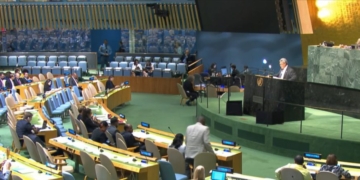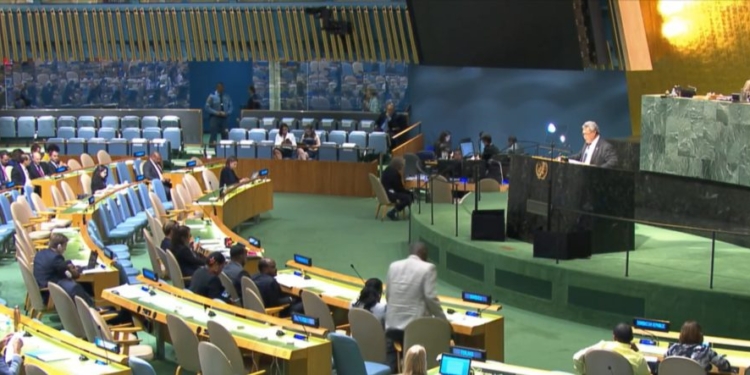Financial institutions across the world are engaging in the height of hypocrisy, publicly renouncing controversial groups while continuing to uphold its principles and objectives.
BlackRock is the latest, and largest, to join a growing list of financial institutions like JPMorgan, Citigroup, Bank of America, Goldman Sachs and Morgan Stanley that are withdrawing from the United Nations’ Net-Zero alliances. But while these institutions may appear to distance themselves from a controversial agenda, they remain steadfast in their commitment to the climate agenda — prioritizing political activism over fiduciary responsibility and economic growth.
A recent study shows coordinated efforts to defund politically disfavored industries, such as fossil fuels, may not only harm consumers, but also violate antitrust laws, according to the Texas Public Policy Foundation and Boyden Gray & Associates.
Banks that publicly pledged to curtail funding for Arctic oil drilling or coal mining may have done so to pressure competitors to follow suit. Such actions, if left unchecked, could jeopardize the energy security of the United States while artificially inflating energy costs for businesses and families alike.
The decision for BlackRock to leave the Net-Zero Asset Managers Initiative (NZAMI) and the banks to leave the Net-Zero Banking Alliance (NZBA) might suggest these financial institutions are responding to growing scrutiny and political pressure over Environmental, Social and Governance (ESG) initiatives.
Legal challenges, such as the lawsuit filed by Texas and 10 other states against major asset managers, allege that ESG policies violate antitrust laws by colluding to constrain fossil fuel production and inflate energy prices. Public backlash against these policies has only intensified, particularly in regions where energy is becoming expensive and scarce.
But actions speak louder than words — or, in this case, affiliations. Despite exiting the NZAMI and NZBA, these financial giants continue to pledge allegiance to net-zero goals, demanding divestment from essential energy sectors like coal and oil in an attempt to starve politically disfavored industries of capital.
The result? Reduced energy security, higher costs for consumers, and a financial system that prioritizes activism over fiduciary duty and financial stability.
Meanwhile, these policies give a competitive advantage to nations like China, which continues to expand coal production for cheap electricity and dominate critical mineral supply chains, further weakening the United States’ energy independence and global economic position.
This contradiction exposes a deeper truth: the ESG movement is not about balance or responsibility. It is about control. By mandating adherence to subjective social and environmental metrics, ESG policies bypass the free market and erode the competitive principles that drive innovation and prosperity.
The hypocrisy of these institutions is stark. On one hand, they tout their departure from these controversial UN alliances, likely hoping to avoid further legal and political backlash. On the other hand, they continue to uphold the same principles that have driven lawsuits and public criticism in the first place.
This serves no one — not the ordinary Americans struggling to make ends meet, not the investors seeking strong returns, and certainly not the global economy, which depends on energy abundance and stability.
If these institutions are serious about restoring trust and accountability, they must go beyond symbolic gestures. It is not enough to leave the NZAMI and NZBA while still practicing what they preach.
Real change requires embracing policies that support energy innovation and accessibility for all. It means prioritizing economic growth and energy security over appeasing activist groups.
Policymakers, too, have a role to play. They must hold financial institutions accountable — for the spirit of competition and fairness that underpins our markets. States like Texas have already taken meaningful steps to protect consumers’ rights, prohibiting taxpayer-funded contracts with companies that collude against the energy sector.
Others should follow suit to ensure that banks and asset managers serve their customers, not narrow ideological agendas.
The recent exodus from the UN’s Net-Zero alliances is not a victory; it is a half-measure. Until financial institutions fully abandon their net-zero commitments and embrace their responsibility to shareholders, clients and the broader economy, they remain complicit in an agenda that undermines energy security and economic freedom.
Actions, not affiliations, define character.
It is time for these money managers to prove they’re serious about serving the interests of the many — not the demands of the few alarmists — and abandon these radical political agendas.
The Honorable Jason Isaac is the Founder and CEO of the American Energy Institute. He previously served four terms in the Texas House of Representatives.
The views and opinions expressed in this commentary are those of the author and do not reflect the official position of the Daily Caller News Foundation.
All content created by the Daily Caller News Foundation, an independent and nonpartisan newswire service, is available without charge to any legitimate news publisher that can provide a large audience. All republished articles must include our logo, our reporter’s byline and their DCNF affiliation. For any questions about our guidelines or partnering with us, please contact [email protected].


























